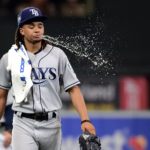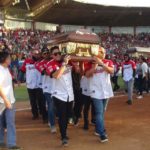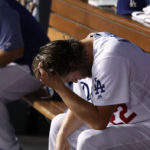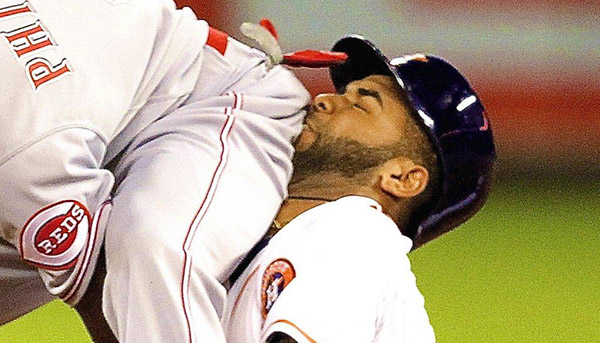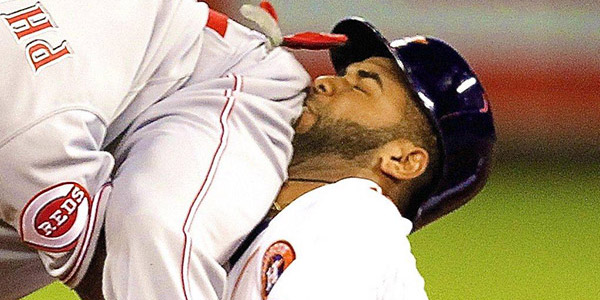Fantasy Baseball: The Real March Madness
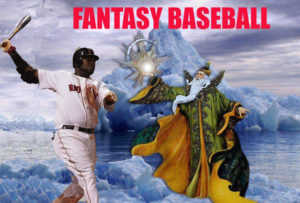 By now, pretty much everyone knows what fantasy baseball is – not just baseball fans or even people who are baseball fan-adjacent. It’s played by millions of people throughout America (and at least a dozen people outside the U.S.), and fantasy sports as a whole is estimated as $4 billion a year industry.
By now, pretty much everyone knows what fantasy baseball is – not just baseball fans or even people who are baseball fan-adjacent. It’s played by millions of people throughout America (and at least a dozen people outside the U.S.), and fantasy sports as a whole is estimated as $4 billion a year industry.
March is traditionally the time all sports take a back seat to college basketball-tournament excitement. Baseball’s spring training just isn’t really that interesting. There are a few starting jobs on the line, a few players recovering from injury, a few players getting injured, and so on. It’s just dudes warming up. So, the NCAA tournament grabs the headlines. However, because of ever-increasing popularity, March has also become fantasy baseball’s time to shine.
This is when fantasy baseball players do almost all of their drafts for the upcoming season. Hundreds of hours are spent sorting through statistics and projections and strategies preparing to assemble the team one thinks will out-perform the other teams in his league. And to people who play fantasy baseball, like myself, this is all very important. Okay, not “very” important, but definitely “kind of very” important.
Fantasy baseball allows a person to build a fake team of real players that he or she can put up against other fake teams of real players. It provides participants the chance to put their baseball knowledge to the test and prove whether they actually could do a better job running a team than those bozo’s in the front office of [favorite team goes here].
“Jerry, just remember. It’s not a lie … if you believe it.” – George Costanza, Seinfeld.
But not really. A “real” baseball team has so many more factors involved in team building and game play that it would be almost impossible to approximate that experience. A “real” team plays against 29 other teams, not nine. A “real” team has variable budget that is different from team to team and from year to year. A “real” team has to deal with real-life drama, like jealousy and egos and who’s drinking beer and eating fried chicken in the clubhouse.
To quote the movie Weird Science: “We know about the reality. Don’t ruin the fantasy.”
Okay, so, fantasy baseball provides joy to so many the whole season long. What do you mean “How do I know they’re having fun?” Look at these fantasy baseball team names:
Honey Nut Ichiros
Grand Theft Votto
Sweet ‘n Mauer Sauce
The Braun Identity
902Cano
Jeters Never Prosper
These are people who are having fun. But there are baseball fans out there who haven’t yet embraced it – and may never. “It puts too much emphasis on the individual players.” “It makes people focus on offense and neglect defense.” “Get off my lawn, you crazy kids.”

Not if Tim Lincecum is on your team.
Yes, fantasy baseball does all those things. But those things are pretty much happening anyway. The backlash that exists is really about some people’s opinion of what it means to be a “real fan.” And, I agree, fantasy baseball does change the way you view games. An L.A. fan who has grown up hating San Francisco might not quite feel so strongly about the Dodgers needing to beat the crap out of the Giants if he’s got Madison Bumgarner on his fantasy baseball team.
But how is this a bad thing? How can a “real fan” sit there and say it’s a bad thing that there’s a way to be a fan of your team and a fan of baseball as a whole and also diffuse your unnecessary anger toward another team and its fan base? The world has enough hatred in it. Taking a little of the edge off is just what the global doctor ordered.
Probably the biggest problem with fantasy baseball is the name itself. “Fantasy” makes it sound like we’re all wandering around Middle Earth with wizards and elves on a mythical journey. And it just isn’t that – though that’s actually a pretty decent metaphor for what fantasy baseball is. But, ugh, I can’t stand those flowing robes – you know everyone wasn’t wearing underwear, right? Gross.
Critics of fantasy baseball make it sound like fantasy baseballers aren’t actually fans of watching baseball and all they care about is the box score numbers. This is the same criticism levied at the advanced statistics movement, and this explains why the two are usually regarded as intertwined. But I think the opposite is the case – fantasy baseballers and stat geeks are huge fans of the sport and are trying to find other ways to enjoy it even more than they were already. Like a kid who hears a song he likes by a band and then downloads their album (legally?) and then watches their videos and then “likes” them on Facebook and then buys their posters and then follows them on tour from town to town and then stalks the lead guitarist just hoping to get some piece of DNA that he can keep for himself for all eternity. Now, that’s a fan!
Fantasy baseball was originally called “Rotisserie Baseball” – named after the little restaurant where the original members would meet. That is a cool name. And the “rotisserie” or “roto” scoring method is still the most popular. However, the founders of “roto” baseball failed to properly exploit their sports fan-changing invention and were left out of the fantasy sports boom. Did I mention the $4 billion? Not one penny of that goes to these guys.
And now we’re all stuck with this stupid “fantasy” label which shames us all and, worse, blocks out others from its joys because of the imminent threat of Dungeons & Dragons-level embarrassment.
Actually, the biggest problem with fantasy baseball, once you’ve gotten involved, is the owners of other teams. Sometimes you play in a league with friends and sometimes it’s just random dudes thrown together by ESPN, Yahoo or whoever and sometimes it’s guys you meet in the baseball message boards. But there is one thing in all fantasy sports that is absolutely absolute: No matter how hard you try, you’re going to have crappy owners in your league.
It doesn’t matter how many rules or incentives you put in place, and there is no amount of pre-screening you can do, there will always be somebody to screw things up or not respond to your trade or trade away his great players to someone else. Maybe this says something about life and the people in the world around us.

Jed’s living room on draft day.
I’m not going to bore you with any one of the hundreds of stories I have about the awful people in the world and how they’ve ruined my day or week or year with some crappy fantasy baseball move. Partly because I think you’d be bored by any of these stories, but mostly because I’m sure you’d think I was nuts (more so than usual) for letting something so petty ruin my day, week or year.
I’ve got three drafts coming up in the next couple weeks. That’s my limit – any more than that and the day-to-day operations can be a bit too time consuming (translation: that’s all I can do before my wife starts to get angry – really angry). There are fantasy baseballers who do a lot more than just three. ESPN has a limit of 10 separate teams per person – that means that some guys were exceeding that limit – and it also means that some guys have 10 teams on ESPN alone. Who knows how many else they have on all the other sites? I know who should know this number: the police. Dial it down, fantasy baseball players with more than a few teams, you’re giving the rest of us a bad name.
By now you might be thinking that this is just a rambling mess of a column that I wrote while my wife went out for the day with one of her friends and I didn’t put much thought into what the actual point was or where it was going and certainly not where it would end. Nope, not true at all.
Anyway, the popularity of fantasy baseball continues to grow. This is a good thing – more and more baseball fans are finding a way to augment their baseball enjoyment, while at the same time gaining a greater appreciation and tolerance for their fellow man.
Jed Rigney is an award-winning filmmaker who also fancies himself a baseball writer. You can follow him on Twitter @JedRigney.


